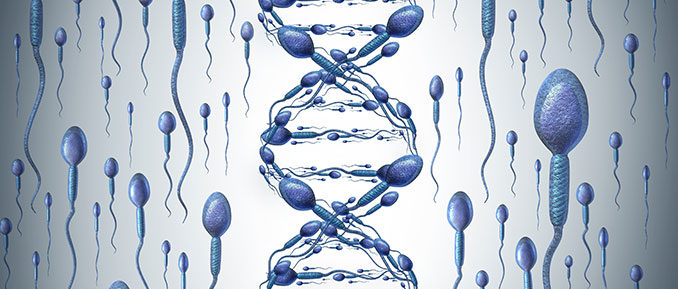
New epigenetic research conducted by scientists at the University of Massachusetts suggests that a father’s environment can affect the health of his baby via epigenetic marks in his sperm. Specifically, male exposure to phthalates, which are endocrine disruptors found in plastics, personal care products like shaving cream, and in the environment that surrounds us, were found to have an impact on a couples’ success when having children.
Led by Richard Pilsner, an environmental health scientist, this ongoing study supported by the National Institutes of Health provides more evidence that a man’s lifestyle choices before trying to conceive with his partner can affect his abilities to do so. The details appeared in a recent issue of Human Reproduction, the monthly journal of the European Society Human Reproduction and Embryology.
Phthalates are gaining an increasing amount of attention, especially in the realm of epigenetics. Research has shown that these common chemicals could tip the epigenetic balance and program someone for obesity. Other studies demonstrate that exposure to even a small amount of a similar endocrine disruptor, bisphenol-A, could epigenetically disrupt fetal development and can lead to permanent and disruptive changes to the marks on DNA.
Being exposed to phthalates has been known to disrupt hormones and is linked to changes in male reproduction including androgen levels and quality of semen, according to Pilsner. This study, the authors consider, is a first of its kind to explore whether DNA methylation in sperm cells might explain how a father’s environment influences sperm epigenetics or development of the embryo, for example.
DNA methylation is a chemical tag placed on DNA that controls gene expression, specifically reducing the expression of genes, without changing the gene sequence. It’s one of the most common epigenetic mechanisms and is very well known for being an important biomarker for cancer.
“There has always been this heavy concern in the past with expectant moms not smoking and not drinking, for example, to protect the fetus. In this study, we see that dad’s environmental health contributes to reproductive success,” Pilsner explained. “For sperm to mature is a 72-day process, almost three months, and our study shows that this preconception time-period may represent an important developmental window by which environmental exposures may influence sperm epigenetics, and in turn, early life development. So in the same way mom needs to be careful, dad also needs to.”
The team’s findings are from the first 48 couples participating in the study, which they hope will reach 250. The group included first author and Ph.D. student Haotian “Howie” Wu, director of the in vitro fertilization (IVF) clinic at Baystate Medical Center Dr. Cynthia Sites, and other colleagues at Wayne State University.
The participants were couples going to the IVF clinic. The researchers collected one urine sample from men on the same day they donated sperm and measured 17 different metabolites from 8 varying phthalate parent compounds. Then, they performed DNA methylation analyses on sperm cells to examine statistical associations. According to Wu, the researchers extracted DNA and analyzed around 485,000 sites for DNA methylation changes. Overall, they identified nearly 6,500 regions of interest that indicated a possible link between environmental exposure to phthalates and DNA methylation.
“Rather than looking for methylation changes at individual sites on the DNA, we looked at DNA regions or clusters on genes that might be more biologically meaningful than individual sites,” said Wu. “It’s not just numbers we were interested in. We wanted to pay attention not only to the statistical relationships, but also the biology.”
At least 131 of all the regions examined were connected with phthalate metabolites, reported the researchers. A majority of the phthalates that were linked with methylation changes in sperm DNA had previously been shown to influence hormones.
“The next step, after identifying associated regions, is to try to determine the possible biological meaning. We examined the biological pathways, or common links between genes, that might be affected in these 131 regions that were identified,” Wu said.
Of the 131 regions, many were associated with genes related to development and growth and cellular maintenance and function. These changes to sperm DNA were also shown to impact early-life development.
“[Thirteen percent] of sperm [differentially methylated regions] were inversely associated with high quality blastocyst-stage embryos after IVF,” reported the team. Essentially, the more DNA methylation they found in the sperm, the poorer the embryo quality was during the blastocyst stage, as defined by the standards indicated by the IVF clinic prior to the transfer of sperm into the uterus.
The team notes that these results are still preliminary and the sample size of 48 male participants should be expanded upon for further investigation. It is uncertain whether these changes in DNA methylation are inherited and whether they can persist during pre- and postnatal development.
Pilsner has been given a multi-million dollar grant to validate and reproduce his findings with a dose-dependent study in mice. “It doesn’t surprise me that sperm carry some sort of environmental legacy to the next generation,” Pilsner added. “What the sperm cell encounters during its development can influence these chemical tags or DNA methylated, and it may well have an effect on the developing embryo and offspring.”
Source: Pilsner, R. et al. (2017). Preconception urinary phthalate concentrations and sperm DNA methylation profiles among men undergoing IVF treatment: a cross-sectional study. Human Reproduction, https://doi.org/10.1093/humrep/dex283.
Reference: UMass Amherst. UMass Amherst Study Suggests Father’s Environmental Exposure Affects Sperm Epigenetics. News & Media Relations.


